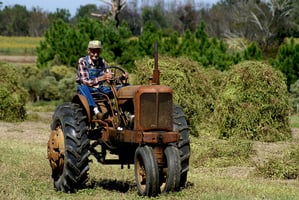"Organic" "All Natural" "Cage Free" "No-Till" All of these are labels designed intentionally to be...
Waste Not, Want Not: How to Get Rich Dirt, Dirt Cheap
"Waste not, want not". This concept applies to nearly every aspect of farming. I was thinking about this while mucking out the barn yesterday. I am harvesting around $1,000 worth of fertilizer from the goats in a single year. And that's just a by-product. Imagine if mega-scale agriculture did not waste resources. Consider, for example, a 1,000 goat dairy. That is 143 times the size of my herd. That means they could get an additional $143,000 worth of fertilizer from the goats. As a by-product! But most large scale farms do not utilize those types of resources. Instead, they get pushed into a nasty lagoon. Or they put it in a giant pile outside. Exposed to the rain and sun, nearly all the goodies in the manure leach away. $143,000 dollars thrown away. And they still haven't paid off the manure lagoon!
Meanwhile, the neighboring conventional corn and soybeans farmer spends $300,000 on fertilizer annually for his 1,000 acre farm. It is a huge waste of resources and money. Folks, it's all wrong. Instead of each farmer wasting his resources and money, they could work together to reduce waste and increase profits.
Here's another example: a cheese factory spends money to throw away the whey. It is a by-product, therefore a waste product. The neighbor has 1,000 farrowing sows. Pigs can live almost exclusively on whey. They could work together to improve their industries. This used to be common. Unfortunately, now it is rare. Especially among large scale farmers. Here's an example of how things ought to work: we have a neighbor who has a horse farm. He gives us trailer loads of composted manure for free, and all his waste hay for mulch. And he loads it for us for free with his tractor. Now, that's a good neighbor. He needs to get rid of his waste, and we need organic matter to increase fertility in our soil.
If every farmer had a relationship like that with his neighbors, there would be very little waste. That's what we need in mainstream agriculture, and also among small farmers.
What are some wasted resources you've noticed?




